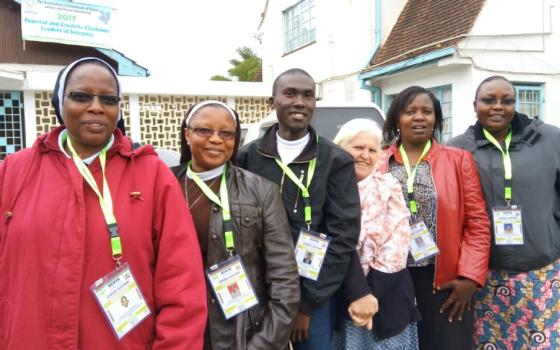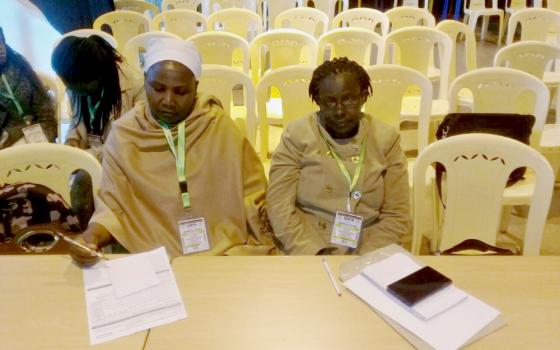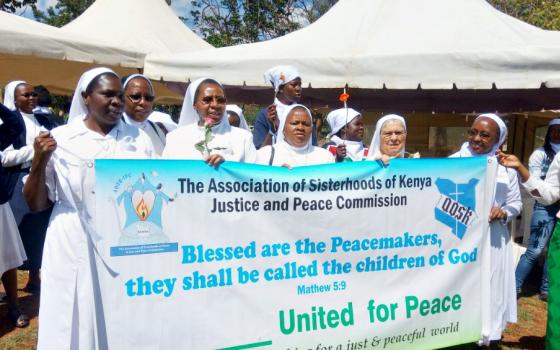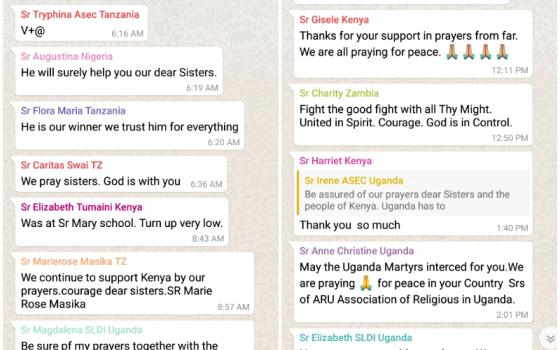At 4:30 a.m. Oct. 27, when the last ballot box from Dagoretti South constituency arrived at the tallying center in Nairobi during the repeat presidential election in Kenya, Sr. Josephine Muthoni Kwenga was waiting.
The Sister of St. Joseph of Tarbes is a coordinator for the Justice and Peace Commission of the Association of Sisterhoods of Kenya, and she was determined to observe all parts of the Kenyan election she could, including polling spots as well as the tallying center. She visited her first poll at 9 a.m. Oct. 26 and kept observing through the night until 11:30 a.m. the next day.
Kwenga was one of more than 70 sisters serving as election observers during the historic presidential election, which was called after the Supreme Court nullified the Aug. 8 vote, citing widespread irregularities.
Election observers worried about low turnout Oct. 26, when voter participation dropped from 80 percent in the August election to 43 percent in October, according to Reuters. Observers blamed low voter turnout on general insecurity as well as on opposition head Raila Odinga, who boycotted the elections and called on his supporters to do the same.
The sisters were part of an estimated 1,770 certified observers in almost every voting constituency in the country with the Elections Observation Group.
"It used to be role of sister was inside the convent, praying, which is important," Kwenga said by phone from Nairobi on Oct. 29, three days after the election, as votes were still being counted and rumors of ethnic clashes skittered across the country. "But today, we are leaders by the virtue of our religious profession. We have a lot of influence. What we say and do touches the community."
"It's a new form of evangelization, whereby religious can take this type of ministry for justice and peace," Kwenga said. Just as sisters practice presence by accompanying people in times of need, sisters observing the election were also practicing presence by showing up as certified election observers, she said.
"The church has to speak where it is required, and we can't speak without evidence," Kwenga added.
In the downtime between keeping tabs on the vote count, Kwenga spent her 26 straight hours of election observing meeting new friends, praying the rosary, and trying to catch a few moments of sleep between arrivals of ballot boxes.
She said that while turnout was low, she observed fewer difficulties than during the Aug. 8 election. During that election, more than 400,000 ballots, or 2.5 percent of the vote, were rejected because voters did not fill them out properly. That figure was three times higher than the number of rejected ballots in the previous election.
Kwenga spent the weeks between the two elections educating voters how to correctly fill out ballots and training sisters how to observe elections fairly and impartially, along with other members of the leadership team of the Association of Sisterhoods of Kenya.
"In Kibera, it was very challenging," she said. "But for people to see a sister speaking to them, to see a sister saying, 'I'm not for this or against that, I'm here to show an example of how to vote,' it was very meaningful."
Kwenga added that while it was a difficult period in Kenya, she was looking at the crisis as a time of growth for the country and its residents. Even within congregations, sisters are growing as they learn to deal with sisters from various ethnic groups who may be interpreting each news event in a completely different way, she said.
Words of encouragement from sisters across Kenya and around the world helped Kwenga keep going through the long night.
For the past two years, Global Sisters Report has run a WhatsApp discussion group for almost 200 sisters from 14 countries in Africa, utilizing the popular messaging application to connect sisters who would otherwise never meet or speak. Once or twice a week, we post a relevant story from the GSR website to the discussion group, which is aimed at sisters who have limited internet access or don't read the homepage on a regular basis.
During the election in Kenya, there was an outpouring of prayers and messages from sisters across Africa.
In the days leading up to the election, Kwenga and Incarnate Word Sr. Mary Magdalene Kanini, country coordinator for the Association of Sisterhoods of Kenya, shared pictures of Kenyan sisters marching for democracy in a peace march prior to the election. Other sisters in Kenya shared updates throughout the day.
"Be assured of our prayers dear Sisters and the people of Kenya. Uganda has you at heart today and after," one sister wrote.
"Fight the good fight with all Thy Might. United in Spirit. Courage. God is in Control," another sister sent from Zambia.
"Please please pray ..." Kanini wrote at one point. "I'm just near Kibera and what we hear is people shouting and gunshots. Sad ... We are watching and will try entering from the other side. Our safety is important though at this moment."
Another sister said she was in a different part of Kibera, Kenya's largest slum on the outskirts of Nairobi, and it was calm.
Kwenga said these short communications, with the GSR group and her other sisters scattered across the country, were invaluable.
"I was very encouraged by responses and support, and I followed every WhatsApp message of support," Kwenga said. "When sisters said they are praying for us, I felt for the first time as religious women we were really connected with each other in this situation. I didn't feel like I was just a Kenyan and I was in Kenya alone with just the Kenyan church. I felt like all the other sisters were praying with me and it was encouraging me and it was like the whole church was in it together."
[Melanie Lidman is Middle East and Africa correspondent for Global Sisters Report based in Israel.]




